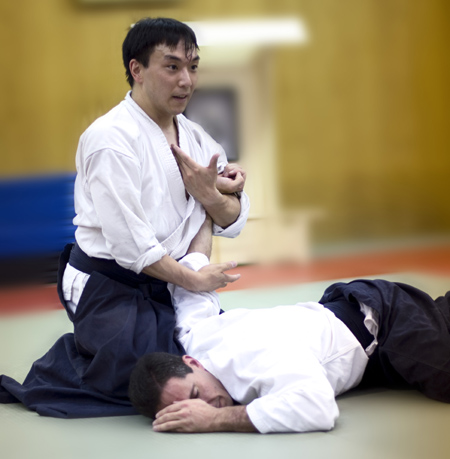This post is the fourth in a series interviewing 3rd degree black belt Aikido practitioner Dwight Sora of Chicago Aikido club. While I’m interested in martial arts for their own sake, Aikido strikes me as having some unusual philosophical lessons about acceptance, change, and growth.
Previous posts in this series are Aikido Interviews, #1: Trying to Discover Truths, Aikido Interviews, #2: “Lift Your Head and Say ‘Isn’t Today a Great Day?’”, and Aikido Interviews, #3: Like Learning How to Play Music.

Luc: What’s the most dramatic thing that comes to mind that has happened to you outside of Aikido but because of Aikido–or to ask the question a different way, has the practice of Aikido changed your experience of the rest of your life?
Dwight: As to whether Aikido has brought about a change in my life: my answer is a definite yes. On the most basic level, it completely changed my relation and attitude towards my physical self. When I started Aikido as an exchange student in Japan in 1993 I was somewhat overweight, out of shape and generally disliked any kind of athletic activity. It’s bizarre in retrospect that I even tried Aikido. Since I was a young child, I was essentially a bookworm, was physically awkward and utterly hated gym class. I never found much success or fun in any sport I attempted to play, which has basically lead to a general uninterest in even being a sports spectator. (To this day, I fully admit, I really have no knowledge of the ins and outs of professional sports whatsoever, a big social disadvantage in the United States of America.)
My early days of training were fairly brutal. Despite Aikido’s peaceful reputation, college Aikido students in Japan are an ultra-dedicated, ultra-serious, borderline militaristic group. We spent as much time doing basic physical training as we did rolling and falling drills and learning techniques. There were days where it took all I could do just to keep up with them, and I always got the impression that they were particularly hard on me because I looked like I should have known better with regard to both training and etiquette. (To clarify, two other exchange students joined the Aikido club with me, and they were both Caucasian-looking.)
But here’s something funny: I refused to quit. Which was also strange, because I had a bad habit of giving into defeatism through most of my childhood and adolescence. Every time I tried something new, I was easily discouraged when I didn’t feel I was getting it right.
But for some reason, with Aikido, I absolutely refused to stop. Something had been activated.
I remember when I returned to the U.S., several people would remark that I looked taller. But I wasn’t at all. My posture had improved. I was walking upright and maintaining eye contact much better than I use to.
Also, as I continued my Aikido training, I simply got better about things like exercise and diet, and even learned to appreciate it a lot more. Being the nerdy guy I was, I was one of those who tended to disparage sports and physical activities (partially sour grapes, I realize now). Aikido didn’t just make me better appreciate taking care of myself, but gave me a greater appreciation of all physical activity, whether sports, dance, acrobatics, etc. (However, to be fair, I’m still totally lost during any conversation about pro football, baseball, etc.)
Advancing in Aikido has definitely helped my confidence over the years. It’s as if climbing over the personal hurdles of training really made me feel like other hurdles were surmountable as well. When it has come to acting, standing up for myself, starting my own business (my main work is as a freelance Japanese document translator), my Aikido experience has certainly contributed to a sense that things can be accomplished.
Readers interested in finding physical activity that transforms you may also want to read “Finding Exercise You Love: The Taekwondo Example”
Photo by Maggie Mui



